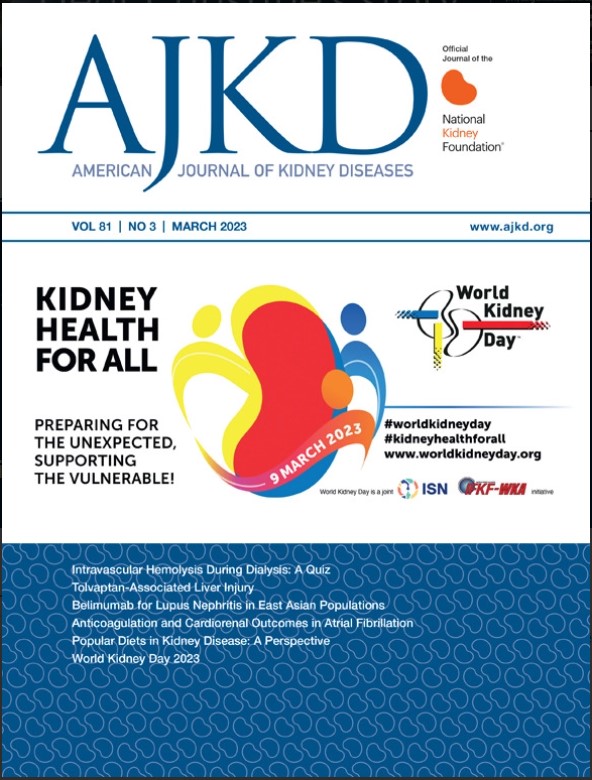一项定性研究:确定拉丁裔老年晚期CKD患者决策辅助的适应需求。
IF 8.2
1区 医学
Q1 UROLOGY & NEPHROLOGY
引用次数: 0
摘要
理由与目的65岁及以上的非裔成年人构成了美国增长最快的少数群体,他们承受着不成比例的肾衰竭负担。决策辅助提高老年慢性肾病患者的决策质量和目标一致性护理。然而,肾脏替代疗法的辅助决策尚未适用于老年拉丁裔成年晚期CKD患者。本研究的目的是评估西班牙语版本的Decision-Aid for Renal Therapy (DART-S)对老年拉丁裔晚期CKD患者的可接受性、可及性和适应性。研究设计:在焦点小组和结构化访谈中应用共享决策技术框架的文化目标和裁剪的定性研究。建议的适应被归类为建议并进行定性分析。环境和参与者进行了5个焦点小组(N=17)和对讲西班牙语的患者和护理伙伴的访谈(N=15)。分析方法:主题分析。结果患者中55%为男性,平均年龄为68±9岁。总体而言,参与者认为DART-S是可接受和可访问的。专题分析揭示了纳入生活经验的重要性,包括患者和家属的证词,以说明慢性肾病的心理健康影响,自我护理策略和家庭透析适应。一些人发现传递预后信息令人苦恼,强调需要更敏感的沟通。量身定制的建议包括有关经济障碍、营养和生活方式的信息。参与者更倾向于在CKD诊断时通过肾脏临床医生传播DART-S,并建议利用社交媒体进行更广泛的传播。局限性:本研究的发现不能推广到拉丁裔亚组之外。法律地位尚未确定。结论有针对性和量身定制的决策辅助是为拉丁裔老年晚期CKD患者提供目标一致和以人为本的护理的必要步骤。未来的研究应该检验DART-S在增加拉丁裔患者的知识和决策质量方面的比较功效。本文章由计算机程序翻译,如有差异,请以英文原文为准。
Identifying Adaptation Needs of a Decision Aid for Older Latino Adults With Advanced CKD: A Qualitative Study.
RATIONALE & OBJECTIVE
Latino adults 65 years and older comprise the fastest growing minoritized group in the US and experience a disproportionate burden of kidney failure. Decision aids improve decisional quality and goal-concordant care among older patients with chronic kidney disease (CKD). However, decision aids for kidney replacement therapy have yet to be adapted for the older Latino adult population with advanced CKD. The objective of this study was to assess the acceptability, accessibility and adaptions needed to facilitate use of a Spanish version of the Decision-Aid for Renal Therapy (DART-S) for older Latino adults with advanced CKD.
STUDY DESIGN
Qualitative study applying the Cultural Targeting and Tailoring of Shared Decision-Making Technology Framework in focus group and structured interviews. Suggested adaptations were grouped into recommendations and analyzed qualitatively.
SETTING & PARTICIPANTS
Five focus groups (N=17) and interviews (N=15) with Spanish-speaking patients and care partners were conducted.
ANALYTICAL APPROACH
Thematic analysis.
RESULTS
Among patient participants, 55% were male and mean age was 68±9 years. Overall, participants found DART-S to be acceptable and accessible. Thematic analysis revealed the importance of incorporating lived experiences, including patient and family testimonials, to illustrate the mental health impact of CKD, self-care strategies, and home dialysis adaptations. Some found the delivery of prognostic information distressing, highlighting the need for more sensitive communication. Tailoring recommendations included information about financial barriers, nutrition, and lifestyle. Participants preferred that DART-S be disseminated via kidney clinicians upon CKD diagnosis and recommended leveraging social media for broader reach.
LIMITATIONS
Findings are not generalizable beyond the Latino subgroups in this study. Legal status was not ascertained.
CONCLUSIONS
Targeting and tailoring decision-aids is a necessary step in providing goal-concordant and person-centered care for older Latino adults with advanced CKD. Future research should examine the comparative efficacy of DART-S in increasing knowledge and decisional-quality among Latino patients.
求助全文
通过发布文献求助,成功后即可免费获取论文全文。
去求助
来源期刊

American Journal of Kidney Diseases
医学-泌尿学与肾脏学
CiteScore
20.40
自引率
2.30%
发文量
732
审稿时长
3-8 weeks
期刊介绍:
The American Journal of Kidney Diseases (AJKD), the National Kidney Foundation's official journal, is globally recognized for its leadership in clinical nephrology content. Monthly, AJKD publishes original investigations on kidney diseases, hypertension, dialysis therapies, and kidney transplantation. Rigorous peer-review, statistical scrutiny, and a structured format characterize the publication process. Each issue includes case reports unveiling new diseases and potential therapeutic strategies.
 求助内容:
求助内容: 应助结果提醒方式:
应助结果提醒方式:


